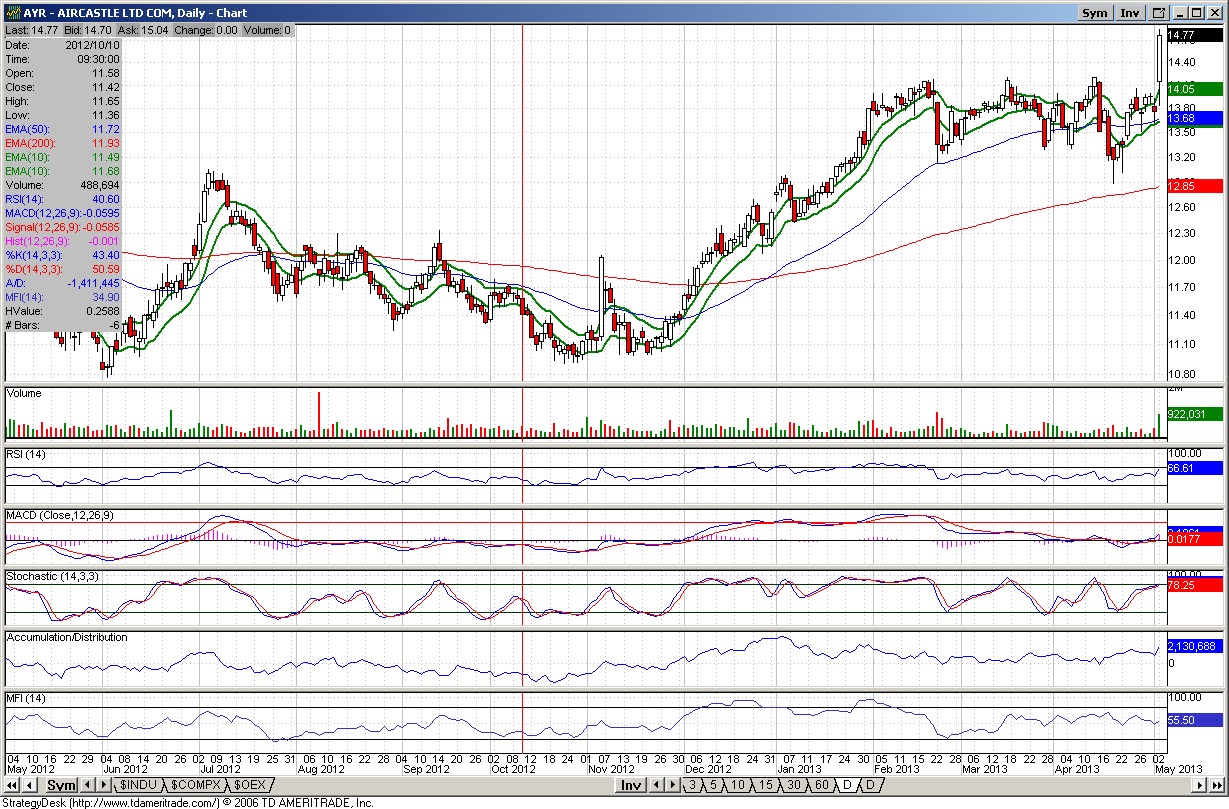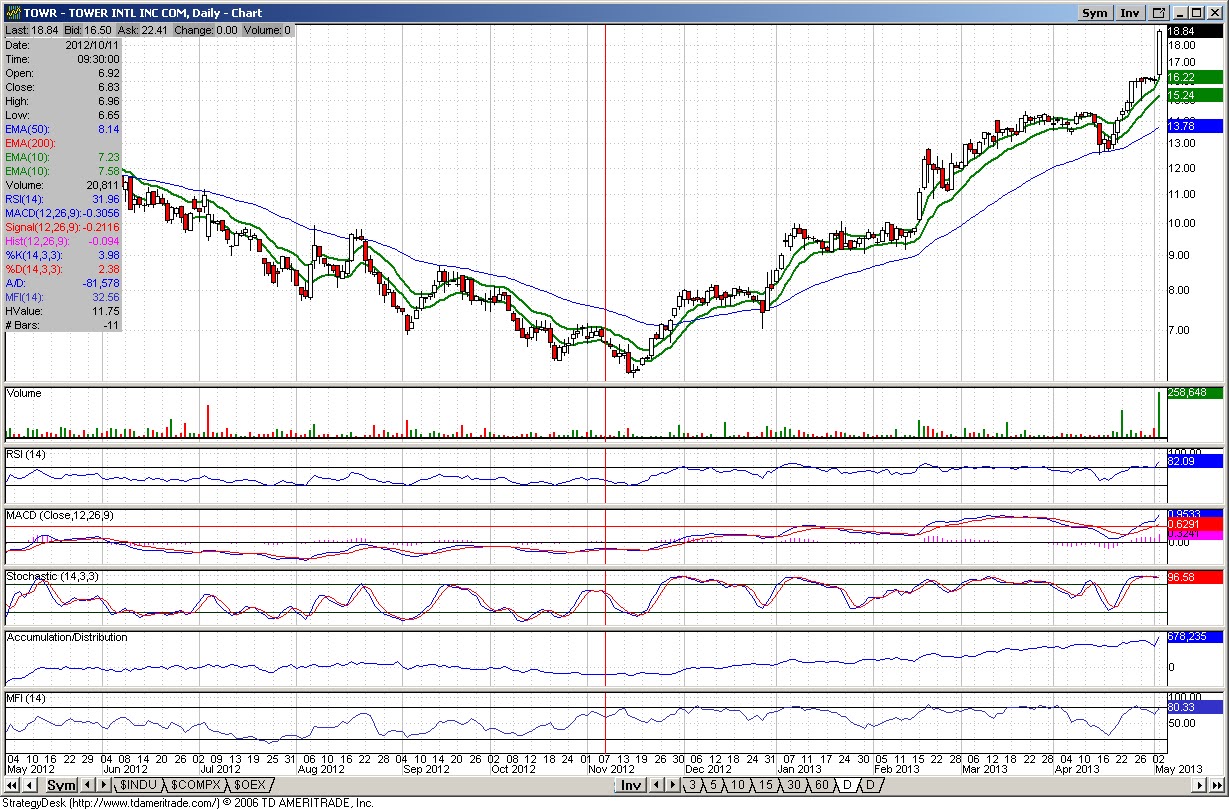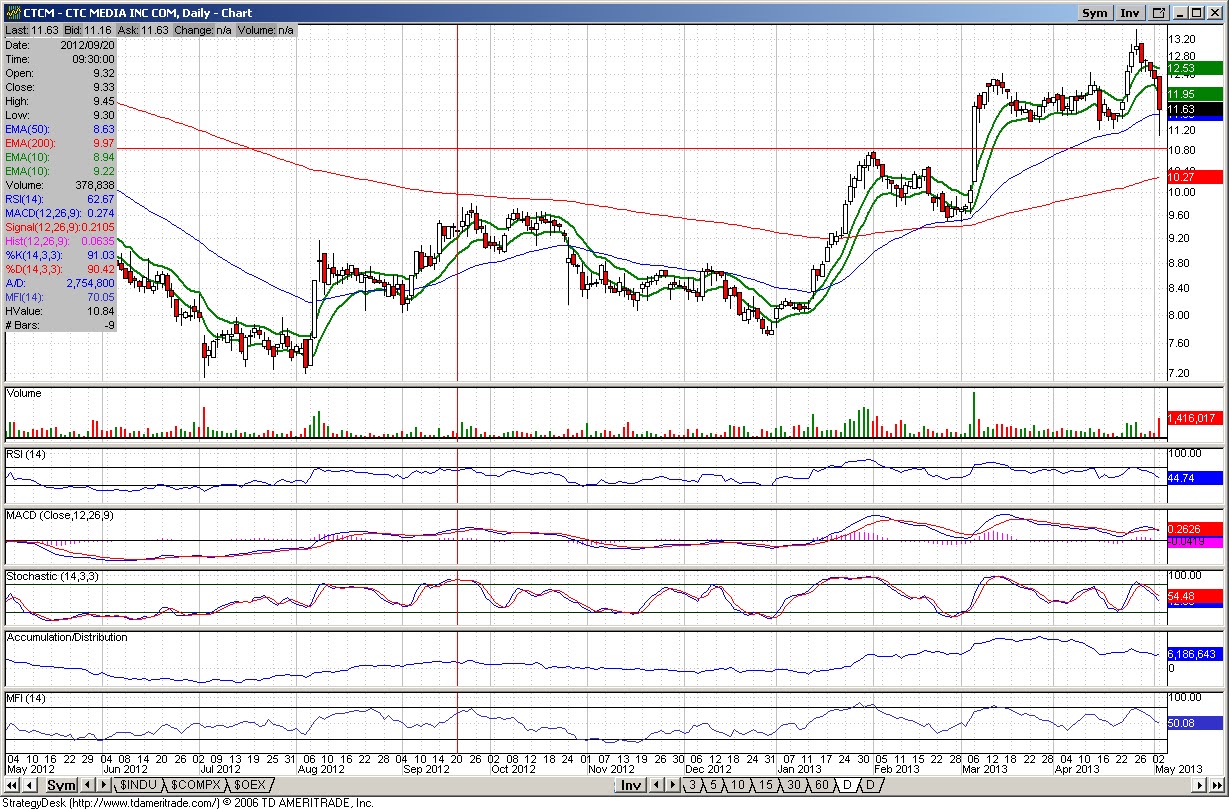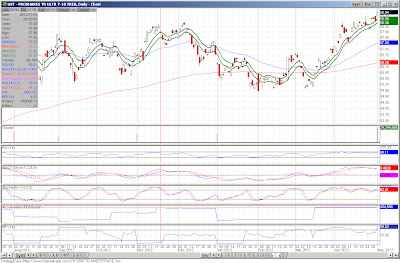Charlie Munger- Bufffet's second in command- stated the following at Berkshire's annual meeting- in regards to the Fed: "Well they had to hurt somebody, and the savers were convenient.". wow, that is one heck of a statement. How about letting the free market decide who is proverbially punished or hurt? Why should the Fed or anyone for that matter decide who is hurt. Statement's like this lead me to think that Buffet and Munger have devolved from capitalists to nothing but statists. It is pathetic of such formally great men for which I have lost all respect for.
Saturday, May 4, 2013
Friday, May 3, 2013
Equity Analysts Tell All
This article originally appeared in in the WSJ.
Having worked in a number of shops as an analyst (mainly buyside) and
as a CFA Chartholder, I would surmise that any analyst worth his or her
salt would argue that any private conversation with management discussed
only public information and that any other 'insights' were obtained via
a mosiac of other information, through what was not said, or mannerism
when statements were given.
To
play devil's advocate to the tone of the below article, the delivery of
public knowledge can have different meanings depending if you read it
in a transcript or on a press release versus hearing it stated in the
greater context of a conversation with various management teams or even
IR for that matter.
Either way, the moral is to do your own homework.
By Jason Zweig
But you can still dream. Consider a new study of stock analysts by a team of accounting and finance professors: The analysts rank private phone calls with management as the most useful source of information for generating earnings forecasts. And promoting private access to corporate management remains one of the best ways for an analyst to get a rise out of clients.
As one analyst told the researchers, “If I call up a money manager, a hedge fund, whoever, and I’ve got a call to make on a stock, and I’m able to say, ‘Hey, by the way, we were able to spend 20-30 minutes talking to senior management,’ boom! Their ears are just straight up.”
Earlier this year, accounting professors Laurence Brown of Temple University, Andrew Call of the University of Georgia, Michael Clement of the University of Texas at Austin and Nathan Sharp of Texas A&M University surveyed 365 sell-side analysts and did 18 direct interviews, detailing how analysts do their work and view their roles. They made the results anonymous to ensure confidentiality.
Their study draws some striking conclusions:
- Asked who was their most important group of clients, 81.5% of analysts picked “hedge funds.” Only 13.3% chose “retail brokerage clients.”
- Fewer than a quarter of the analysts said that the “accuracy and timeliness” of their earnings forecasts were very important to their compensation. Only 35% said that the profitability of their stock recommendations was crucial in determining how much they earned. Their “standing in analyst rankings or broker votes,” however – essentially how they score in media surveys, “broker votes” and other annual popularity contests among clients – was very important in shaping compensation for 67% of the analysts.
- Approximately one in four analysts has been pressured by a supervisor to lower earnings forecasts, presumably because that makes the forecasts easier for companies to beat – thereby pleasing investors and companies alike.
- Only half of analysts said that primary research, like discussions with customers and suppliers, was very useful in forecasting earnings or recommending stocks.
- Nearly 40% of analysts said that it was very likely that they would lose access to management or be “frozen out” of question-and-answer sessions on conference calls if they issued an earnings forecast well below the Wall Street average.
- What would happen if analysts suspect a deliberate attempt by management to misrepresent a company’s financial statements? Most said they would respond by seeking additional information. But 4% of analysts said it isn’t at all likely that they would request any further explanation from management or investigate outside the company. And 7% said there was almost no chance that they would lower their earnings forecast or downgrade the stock.
- More than two thirds said that private phone calls with management were far and away the most important factor in their work.
- It’s customary for analysts to have private phone discussions – one-on-one – with a company’s chief financial officer shortly after the company’s public conference call to discuss its quarterly earnings.
- Wall Street firms will go to great lengths to try identifying the “tells” that are supposed to tip off listeners that someone is shading the truth or lying – even though much of this effort is little better than voodoo and psychobabble. One analyst said of private telephone calls with management: “You can read their body language -even on the phone – and get a feel for how optimistic they are or how realistic something might be.” One brokerage firm, said an analyst, brought in an FBI profiler who educated the research team for four hours on how to read subtle cues that can indicate deceptive behavior. (The FBI, on its website, points out that there’s no such thing as an “FBI profiler.”)
Ron Paul + Jim Rogers on the government: "They'll use force and they'll use intimidati
No matter what Ben Bernanke has told you... we have disobeyed economic law. - Ron Paul
Qucik Employment Thoughts- Job Creation Rate is Not Enough
I plan on taking a look at the employment later and see if it has any implications or insights in to the state of the economy. However, I saw a headline that I thought was bit interesting. It stated that the 165,000 jobs the BLS stated the economy created in April was a pleasant surprise. This, at least in my mind, follows the narrative concerning the state of job creation in the U.S. and the reset of the hurdle rate of what is an acceptable jobs number.
Put it this way, the 165,000 jobs created in US is far short of what is needed relative to population growth. Over the last five years, population has grown by an average of 200,000 people per month. Jobs creation has consistently underperformed this hurdle rate for years.
Put it this way, the 165,000 jobs created in US is far short of what is needed relative to population growth. Over the last five years, population has grown by an average of 200,000 people per month. Jobs creation has consistently underperformed this hurdle rate for years.
Thursday, May 2, 2013
Volume Off the High- Part II Shorting the Russell 2000
I was running through some charts and I have an addition to the volume off the high list...... the IWM or Russell 2000 ETF.
I think this chart bears close watching. The small caps are losing energy. A lot of it actually. The RSI has clearly diverged from the price trend, making successively lower highs since February versus price that has been up to flat. The same can said about the MACD and stochastics, with both diverging, and suggesting that momentum is on the down swing.
More worrisome is that downside volume is acceleration with 50 to 65 million shares changing on hands on downtrend seen in the beginning of April, followed by mid-April sale where 75 to 100 million shares hands, and finally 120 million shares in yesterday's selloff. To me, this suggests institutional money getting out of riskier assets, a worrisome event if it proves true.
Additionally, I thought it would illustrative to run the IWM through my Price/Volume Diffusion Index. The following are the results.

The diffusion index has fallen off the map in recent trading days, presently sitting at 46.3. This is below 50 and suggests future weakness in the price.
With the fall off in the diffusion index and the negative setup technically, I am taking a short position in the IWM in the Short-Trading portfolio. Additionally, I am going long the Inverse (1x) Russell 2000 ETF (ticker RWM) in the Long-Trading Portfolio.
I have concerns that what we are seeing here in the Russell 2000 has broader implications for a reweighting of risk across broader market.
I think this chart bears close watching. The small caps are losing energy. A lot of it actually. The RSI has clearly diverged from the price trend, making successively lower highs since February versus price that has been up to flat. The same can said about the MACD and stochastics, with both diverging, and suggesting that momentum is on the down swing.
More worrisome is that downside volume is acceleration with 50 to 65 million shares changing on hands on downtrend seen in the beginning of April, followed by mid-April sale where 75 to 100 million shares hands, and finally 120 million shares in yesterday's selloff. To me, this suggests institutional money getting out of riskier assets, a worrisome event if it proves true.
Additionally, I thought it would illustrative to run the IWM through my Price/Volume Diffusion Index. The following are the results.
The diffusion index has fallen off the map in recent trading days, presently sitting at 46.3. This is below 50 and suggests future weakness in the price.
With the fall off in the diffusion index and the negative setup technically, I am taking a short position in the IWM in the Short-Trading portfolio. Additionally, I am going long the Inverse (1x) Russell 2000 ETF (ticker RWM) in the Long-Trading Portfolio.
I have concerns that what we are seeing here in the Russell 2000 has broader implications for a reweighting of risk across broader market.
An Alternative Gold-Bug Thesis.
Listen twice. If you are in the gold market, this video is well worth listening to
Subscribe to:
Comments (Atom)




































